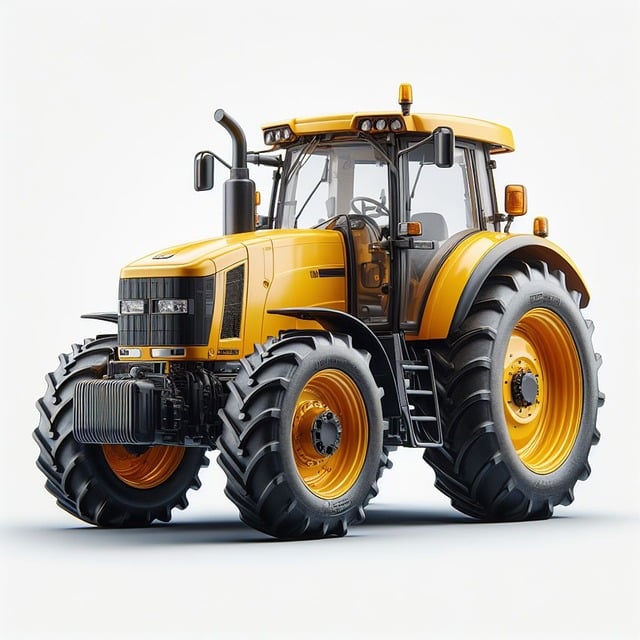When selecting a lawn tractor battery, it's crucial to match the replacement with your tractor's manufacturer specifications, focusing on the amp-hour (Ah) rating for operating time and reserve capacity (RC) and cold cranking amps (CCA) for performance in various temperatures. Opt for a maintenance-free type like an AGM battery for ease of use and reliability, or consider a lithium-ion battery for its lightweight design and high energy density. Regular maintenance includes checking the battery's water level in lead-acid models, ensuring clean and secure terminals, and monitoring for any signs of wear or damage. If your battery is not holding a charge, it may require reconditioning or replacement. Always inspect the entire electrical system, including cables and terminals, for corrosion or looseness that could affect battery performance. Remember to dispose of old batteries responsibly due to their hazardous materials. For optimal lawn tractor operation and longevity, consistently maintain your battery, address issues promptly, and consider environmental factors in disposal.
When it comes to maintaining a healthy, efficient lawn tractor, the battery’s role is pivotal. This article delves into the essential aspects of selecting and caring for the right lawn tractor battery, guiding you through the technicalities, top brands, and various types available. From understanding the fundamentals of lawn tractor batteries to identifying the best brand for your needs, we explore key performance factors, compare different battery technologies like wet cell, AGM, and lithium-ion, and discuss capacity and reserve power requirements. Additionally, we address battery life maintenance and troubleshoot common issues for optimal tractor performance. Whether you’re a seasoned user or new to lawn tractor upkeep, this comprehensive guide will ensure your machinery runs smoothly, with insights on how to extend its lifespan and enhance operational efficiency.
- Understanding Lawn Tractor Battery Fundamentals
- Key Factors Influencing Lawn Tractor Battery Performance
- Top Lawn Tractor Battery Brands: A Comparative Analysis
- Types of Lawn Tractor Batteries: Wet Cell vs. AGM vs. Lithium-Ion
- Lawn Tractor Battery Capacity and Reserve Power: What You Need to Know
- Factors Affecting Lawn Tractor Battery Life and Maintenance
- How to Select the Best Lawn Tractor Battery for Your Needs
- Troubleshooting Common Lawn Tractor Battery Issues and Replacements
Understanding Lawn Tractor Battery Fundamentals

When addressing the heart of a lawn tractor’s power, understanding lawn tractor batteries is paramount. These batteries are the unsung heroes that provide the electrical energy necessary for the tractor to operate, from starting the engine to powering electrical accessories and ensuring consistent performance. A lawn tractor battery typically falls into one of two categories: lead-acid or lithium-ion. Lead-acid batteries have been the traditional choice due to their reliability and affordability; however, they are generally heavier and have a shorter lifespan compared to their lithium-ion counterparts. On the other hand, lithium-ion batteries are lighter, often last longer, and offer a higher number of charge cycles before their capacity diminishes significantly.
For optimum performance, it’s crucial to consider the ampere-hour (Ah) rating of the battery, which indicates the amount of energy the battery can supply. A higher Ah rating means the battery can deliver more power, which is particularly beneficial for lawn tractors with heavy-duty attachments or those that are used frequently over large areas. Additionally, the cold cranking amps (CCA) measurement is essential, especially in colder climates, as it reflects the battery’s ability to start in low temperatures. When selecting a lawn tractor battery, it’s important to match the battery type, size, and capacity to the specific needs of your tractor and usage patterns. Regular maintenance, such as keeping the terminals clean and ensuring the battery is charged, will also enhance its longevity and ensure consistent, reliable operation season after season.
Key Factors Influencing Lawn Tractor Battery Performance

When evaluating lawn tractor batteries, several key factors significantly influence their performance and longevity. The first factor to consider is the type of battery used in the lawn tractor. Lead-acid batteries have traditionally been the standard due to their affordability and reliability, but they are being increasingly replaced by more advanced options like AGM (Absorbent Glass Mat) or lithium-ion batteries. These modern batteries offer higher energy density, better charge retention, and greater resilience against vibration and temperature extremes, which are common in outdoor lawn tractor use.
Another crucial aspect is the battery’s capacity, measured in ampere-hours (Ah). A higher Ah rating means the battery can deliver more power for a longer period. This is particularly important for lawn tractors that require sustained performance over extensive areas or have additional electrical accessories like headlights or electric blade engagement. Additionally, the size and dimensions of the battery should align with the tractor’s design to ensure proper fitment and prevent operational issues. Regular maintenance, such as keeping the terminals clean and ensuring the battery is fully charged, also plays a role in maintaining optimal performance. Lastly, climate considerations are paramount; batteries perform differently in various temperature conditions. Users in regions with extreme temperatures should opt for batteries specifically designed to handle such environments to avoid premature failure and ensure consistent lawn tractor performance.
Top Lawn Tractor Battery Brands: A Comparative Analysis

When evaluating lawn tractor batteries, it’s crucial to consider the ampere-hour (Ah) rating and reserve capacity, as these factors determine the battery’s lifespan and performance during prolonged use. Among the top brands for lawn tractor batteries, Exide stands out with its heavy-duty designs that cater to various models of lawn tractors. Their products often feature a high Ah rating and robust construction, ensuring consistent power delivery over time. Interstate Batteries is another leading brand recognized for its long-lasting performance and advanced AGM (Absorbent Glass Mat) technology, which provides excellent protection against vibration and temperature extremes, a common concern in outdoor equipment.
Duracell Auto Parts, synonymous with long-lasting power in their consumer electronics, also offer lawn tractor batteries that are designed to match the performance standards consumers expect. Their batteries come with various sizes and capacities to fit an array of lawn tractor models. Meanwhile, Optima Batteries specialize in AGM and spiral cell technology, offering deep cycle capabilities and quick recharge times, which are particularly beneficial for frequent use on large properties. Finally, DieHard, with its reputation for reliable starting batteries for vehicles, also provides lawn tractor options that ensure consistent power and reliability, making it a strong contender in the market of lawn tractor batteries. Lawn tractor battery selection is not just about brand reputation; it’s also about finding the right fit for your specific lawn tractor model and usage needs.
Types of Lawn Tractor Batteries: Wet Cell vs. AGM vs. Lithium-Ion

When considering the various types of lawn tractor batteries, understanding the differences between Wet Cell, AGM (Absorbent Glass Mat), and Lithium-Ion batteries is crucial for making an informed decision. Each type offers unique advantages that cater to different needs and preferences of lawn tractor users.
Wet Cell batteries, also known as lead-acid batteries, have been the traditional choice for powering lawn tractors. They are recognized for their reliability and affordability. These batteries consist of sulfuric acid and water in electrolyte solution-filled cells. The Wet Cell battery delivers steady performance over a long service life, making it a go-to option for those who prioritize value for money in lawn tractor battery options.
In contrast, AGM batteries represent a more advanced technology, offering spill-proof construction and enhanced durability compared to their Wet Cell counterparts. They are designed with a non-spillable electrolyte solution, encased within the battery, which makes them ideal for use in all-terrain conditions. AGM batteries are also known for their high cranking amps and long shelf life, ensuring that your lawn tractor starts reliably, even after sitting idle for extended periods. Lithium-Ion batteries stand at the forefront of battery technology, offering the highest energy density and lightest weight of all three types. They are perfect for modern electric or hybrid lawn tractors due to their ability to handle high loads and deliver consistent power without degrading over time. Their fast recharge times and long operational life make them a top choice for those seeking performance and convenience in their lawn tractor battery solution. When selecting the best lawn tractor battery, it’s important to consider these types and understand how they align with your specific requirements for power, durability, and ease of maintenance.
Lawn Tractor Battery Capacity and Reserve Power: What You Need to Know

When selecting a lawn tractor battery, understanding the capacity and reserve power is crucial for maintaining your garden equipment’s performance and longevity. Lawn tractor batteries are typically lead-acid or AGM (Absorbent Glass Mat) types due to their robust construction and long service life. The capacity of a lawn tractor battery, often measured in ampere-hours (Ah), indicates the amount of energy the battery can hold. For instance, a 50 Ah battery can theoretically supply 50 amperes for one hour. However, it’s not just about the raw capacity; the reserve power, or how much usable power remains after the alternator charges the battery during operation, is equally important. A high-capacity battery with low reserve power may struggle to start your tractor or keep it running, especially if you have a model with electric-over-hydraulic (EH) control, which relies heavily on the battery for operation.
To ensure optimal performance, consider the specific needs of your lawn tractor. Factors such as the size of your garden, the frequency and duration of use, and the type of terrain will influence the battery’s demand. For instance, frequent starts in a short period or operating on slopes can deplete the battery faster. Look for batteries with high cold cranking amperes (CCA) if you live in a region with low temperatures, as this will ensure the battery performs well even under such conditions. Additionally, maintenance-free options like AGM batteries are favored for their spill-proof nature and longevity, making them an ideal choice for lawn tractors. Always refer to your tractor’s manufacturer specifications when selecting a compatible battery, as different models may have varying electrical requirements.
Factors Affecting Lawn Tractor Battery Life and Maintenance

Lawn tractor batteries, a critical component for the functionality and efficiency of your lawn tractor, have a lifespan that can be influenced by various factors. To ensure optimal battery performance and longevity, it’s crucial to understand these elements. Ambient temperature plays a significant role; extreme cold or heat can degrade battery chemistry, leading to reduced capacity and shorter life. Regular use under load helps maintain the battery’s state of charge, preventing sulfation buildup which can impair its ability to hold a charge. Another important factor is proper charging practices. Consistent, correct charging protocols prevent overcharging or undercharging, both of which can shorten battery life. Additionally, keeping the terminals clean and free from corrosion ensures efficient electrical connection and extends battery life.
Maintenance also involves monitoring the water level in lead-acid batteries, as distilled water is necessary to keep the plates submerged. This prevents dry-out and potential damage. It’s equally important to store your lawn tractor indoors, in a cool, dry place when not in use, to protect the battery from environmental factors that can cause premature aging. Regularly inspecting the battery for any signs of wear or damage, as well as the overall condition of the lawn tractor, will help in early detection of potential issues and ensure that your lawn tractor battery serves you well over time. By understanding these factors and implementing a maintenance schedule, you can significantly enhance the performance and lifespan of your lawn tractor battery.
How to Select the Best Lawn Tractor Battery for Your Needs

When selecting a lawn tractor battery that suits your needs, it’s crucial to consider several key factors. Firstly, analyze the make and model of your lawn tractor; manufacturers often specify the type and size of battery required for optimal performance. Secondly, assess the amp-hour (Ah) rating of the battery, which indicates the amount of energy it can deliver over a given period. A higher Ah rating typically means a longer runtime for your tractor, especially during intensive work. Additionally, consider the reserve capacity (RC) and cold cranking amps (CCA) if you operate in variable climates, as these metrics determine how well the battery performs in different temperatures.
Another important aspect is the type of battery technology. Wet cell lead-acid batteries have been the traditional choice for lawn tractors but are being gradually replaced by more efficient and longer-lasting options like absorbed glass mat (AGM) and lithium-ion batteries. AGM batteries, in particular, offer spill-proof construction, better performance in extreme temperatures, and a longer lifespan compared to their lead-acid counterparts. Lithium-ion batteries are becoming increasingly popular due to their lightweight design, high energy density, and ability to handle multiple discharge/charge cycles without significant loss of capacity. Before making your purchase, ensure you compare warranties and read customer reviews to gauge the reliability and durability of various lawn tractor battery brands. By carefully considering these factors, you’ll be able to select a lawn tractor battery that will deliver consistent performance for your specific requirements.
Troubleshooting Common Lawn Tractor Battery Issues and Replacements

When encountering issues with your lawn tractor battery, it’s crucial to identify the problem promptly to maintain the performance and longevity of your equipment. A common issue is a dead or weak battery, which can be caused by leaving the lights on, a faulty voltage regulator, or simply the natural aging of the battery. Regular maintenance includes checking the water levels in flooded lead-acid batteries and ensuring clean and tight connections at terminals. If the battery is not holding a charge, it may need reconditioning or replacement. Replacement batteries come in various types, including sealed lead-acid (AGM), gel cell, and lithium-ion, each with its own set of advantages regarding lifespan, charge retention, and cold-weather performance. When replacing a battery, consider the lawn tractor’s make and model to ensure compatibility and optimal function. Additionally, inspect the battery cables and terminals for corrosion or loose connections, as these can also affect battery life and functionality. Properly disposing of old batteries is also important due to their hazardous contents. Always consult the lawn tractor’s manual or a professional for guidance on selecting the correct battery type and installation procedures to ensure safe and reliable operation. Regular monitoring and timely replacements can prevent inconvenient malfunctions and prolong the life of your lawn tractor.
When selecting a lawn tractor battery, it’s crucial to consider the brand’s reputation for reliability and performance alongside the battery type that best suits your tractor’s specifications and usage demands. Our comprehensive analysis of top lawn tractor battery brands reveals that while each has its strengths, understanding the fundamental differences between wet cell, AGM, and lithium-ion batteries, as detailed in this article, empowers you to make an informed decision. Factors such as capacity, reserve power, and maintenance requirements play a pivotal role in ensuring your lawn tractor operates efficiently for years to come. By carefully considering the insights provided on battery life factors, selecting the most appropriate lawn tractor battery becomes straightforward. Remember, regular maintenance and understanding common issues can extend your battery’s lifespan and minimize downtime. With this knowledge, you are well-equipped to maintain your lawn tractor in optimal condition, ensuring it remains a reliable companion for all your outdoor tasks.



